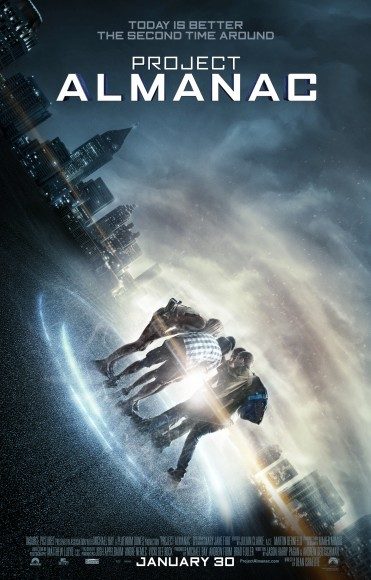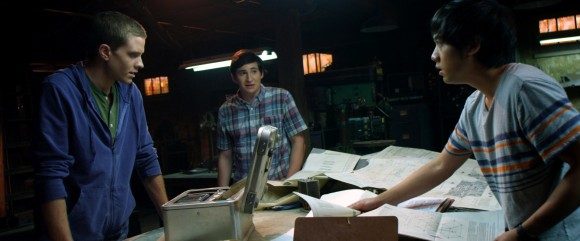Oh, Project Almanac, what are we to do with you? You, who so desperately wants to be the second coming of Chronicle. There is no easy answer, because to look dispassionately at this movie reveals a wealth of problems, most of them to do with clichéd high school plot tropes and the issues inherent to making a found footage movie. And yet…to look, erm, passionately (?) at Project Almanac reveals a movie that is earnestly striving to be charismatic, and has just enough good ideas to kind of pull it off.
So first things first, this is a found footage thriller about a collection of high schoolers who discover a prototype time machine and are smart enough to get the darn thing working. They’re led by David (Johnny Weston), aspiring MIT-attendee and brilliant engineer who’s shy around longtime crush Jessie (Sofia Black-D’Elia). David’s kid sister Christina (Virginia Gardner) and best friends Quinn and Adam (Sam Lerner and Allen Evangelista, respectively) round out the crew. The excuse for filming everything important, such as it is, comes primarily from Christina, but is aided and abetted by the need to record experiments with the time machine along the way with a collection of camcorders and GoPros. At least twice a character makes some comment to the effect of, “Damn, you really film everything, don’t you?” but that’s about as far as the movie is concerned with justifying the found footage style. You don’t have to watch too closely to appreciate that there is some absurdly cinematic photography going on.
Where Project Almanac succeeds the most is in the sort of dumb high school-y fun of having a time machine nobody else knows about it. The shenanigans involved are fairly expected. They win the lottery with a sure thing ticket. They re-take failed tests at school. They buy passes to Lollapalooza months after the festival – and then go back to take full advantage of them. But in addition to sharing in the “Wouldn’t it be cool if…” fantasy of the premise, Project Almanac is just smart enough to put a bit of a twist on most of these little adventures. So a test isn’t aced the first time it’s re-taken, but we get a comic loop of an increasingly overconfident and exasperated character who – funny enough – actually has to learn in order to cope with the random nature of the teacher’s questions. There’s also just enough peril to the early tests of the time machine to keep subsequent adventures ripe with the underlying tension that something could go wrong.
And this is the other part of Project Almanac that, more or less, works better than you might expect. On their first jump back through time, the group discovers that there’s a consequence for seeing yourself after going back in time – a sort of feedback loop ensues which can cause you to wink out of existence. A lot of time travel movies have a similar idea that it’s no good to see yourself, but I like the way it’s handled here, giving the impression that travelling through time is like parsing some particular wavelength of a larger electronic signal. Thematically, the movie’s in a similar boat. The movie uses its time travel mechanics to point to the idea that action (and inaction) is enormously consequential, shaping not only who we are as people but also the world around us. Again, not exactly original (it even employs all-too-familiar butterfly effect as a key mechanic to drive the idea home), but it’s a nice counterbalance to the wanton fun of the earlier parts of the movie and, particularly given the ending, gives Project Almanac a decent backbone.
But whether you’re able to focus on any of those better parts really comes back around to your ability to put up with not only the questionable use of found footage techniques, complete with too many luxuriant shots of boobs, butts, and legs (is this the wrong time to remind you this movie was produced by Michael Bay?), but also with the stereotypical high school trappings and Project Almanac is saddled with. This shows up primarily in the script, as we’re drug through the fringes of the sort of high school rager that only exists in movies, shown high-school kids solving problems DARPA apparently couldn’t, and made to focus on a budding romance-centered plot that doesn’t do anything fresh in that area. But the script shortcomings are manifest far worse in what the characters are saying rather than what they’re doing. Just because inane dialogue is organic to the characters, that doesn’t make it dialogue we want to hear. And there are some lines that even escape the, “This is how high school kids talk,” excuse and are particularly cringeworthy regardless of context.
If you did not come prepared with rubber boots and nose plugs, your opinion of Project Almanac is very quickly going to sink into the mass of found footage and high school trope-laden muck it asks the audience to wade through. However, I can’t deny that I had fun with this movie. Despite the overly familiar elements, which extend even to the parts of Project Almanac I most enjoyed, a sense of adventure mixed with a hint of thematic complexity and just enough humor and originality keep this from being a movie that’s easy to overlook completely. It’s the January doldrums, and so long as you know what you’re in for, Project Almanac comes with a recommendation as some good time-travellin’ escapist fun.


